情态动词+have done
情态动词 have done难点突破 (2)
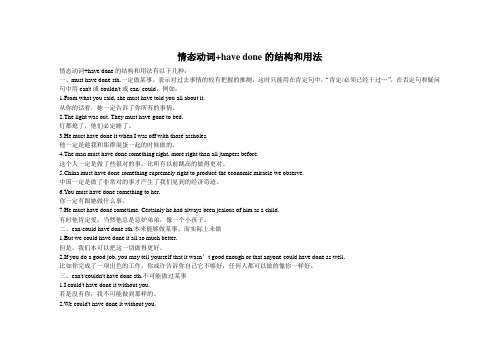
情态动词+have done的结构和用法情态动词+have done的结构和用法有以下几种:一、must have done sth.一定做某事。
表示对过去事情的较有把握的推测,这时只能用在肯定句中,“肯定/必须已经干过…”,在否定句和疑问句中用can't或couldn't或can/ could,例如:1.From what you said, she must have told you all about it.从你的话看,她一定告诉了你所有的事情。
2.The light was out. They must have gone to bed.灯都熄了,他们必定睡了。
3.He must have done it when I was off with those assholes.他一定是趁我和那群混蛋一起的时候做的。
4.The man must have done something right, more right than all jumpers before.这个人一定是做了些很对的事,比所有以前跳高的做得更对。
5.China must have done something supremely right to produce the economic miracle we observe.中国一定是做了非常对的事才产生了我们见到的经济奇迹。
6.You must have done something to her.你一定有跟她做什么事。
7.He must have done sometime. Certainly he had always been jealous of him as a child.有时他肯定爱,当然他总是忌妒弟弟,像一个小孩子。
二、can/could have done sth.本来能够做某事,而实际上未做1.But we could have done it all so much better.但是,我们本可以把这一切做得更好。
情态动词+have done

情态动词+have done:对过去行为或动作表示推测、评论或判断一、虚拟语气1、should have done:过去本应该做某事却未做否定结构should‘t have done:过去本不该做某事却做了2、ought to have done:过去本应该做某事却未做否定结构oughtn‘t to have done:过去本不该做某事却做了3、need have done:过去本有必要做某事却未做否定结构needn‘t have done:过去本没必要做某事却做了4、could(不能用can)have done:过去本能够做某事却未做否定形式couldn‘t have done没有虚拟语气的用法couldn’t have done只能表推测,=can’t have done:过去不可能做了某事5、might(不能用may)have done:过去本可以做某事却未做否定形式might not have done没有虚拟语气的用法。
might not have done只能表推测,=may not have done:过去可能没有做某事二、推测1、must have done:过去肯定做了某事。
不存在mustn’t have done的形式。
否定或疑问形式须用can(could) have done(不可能,肯定不会)来表示。
2、may/might have done :过去可能做了某事may比might 表示的可能性在说话人看来稍大些。
may/might not have done:过去可能没有做某事3、can/could have done:can have done一般用在否定句和疑问句中,表示不相信或怀疑的态度。
could have done还可以用于肯定句,表示本来可能完成而实际未完成。
PS: 表示推测过去某动作发生的可能性时,就表示的可能性程度而言:mus t>could>may>might 情态动词的回答方式:。
情态动词+have done的用法
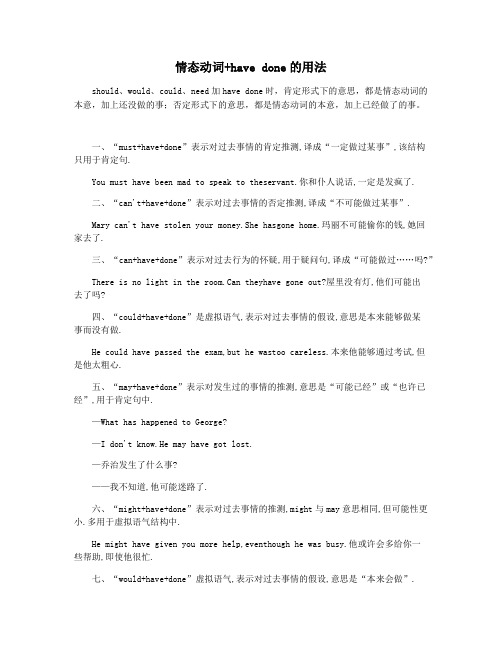
情态动词+have done的用法should、would、could、need加have done时,肯定形式下的意思,都是情态动词的本意,加上还没做的事;否定形式下的意思,都是情态动词的本意,加上已经做了的事。
一、“must+have+done”表示对过去事情的肯定推测,译成“一定做过某事”,该结构只用于肯定句.You must have been mad to speak to theservant.你和仆人说话,一定是发疯了.二、“can't+have+done”表示对过去事情的否定推测,译成“不可能做过某事”.Mary can't have stolen your money.She hasgone home.玛丽不可能偷你的钱,她回家去了.三、“can+have+done”表示对过去行为的怀疑,用于疑问句,译成“可能做过……吗?”There is no light in the room.Can theyhave gone out?屋里没有灯,他们可能出去了吗?四、“could+have+done”是虚拟语气,表示对过去事情的假设,意思是本来能够做某事而没有做.He could have passed the exam,but he wastoo careless.本来他能够通过考试,但是他太粗心.五、“may+have+done”表示对发生过的事情的推测,意思是“可能已经”或“也许已经”,用于肯定句中.—What has happened to George?—I don't know.He may have got lost.—乔治发生了什么事?——我不知道,他可能迷路了.六、“might+have+done”表示对过去事情的推测,might与may意思相同,但可能性更小.多用于虚拟语气结构中.He might have given you more help,eventhough he was busy.他或许会多给你一些帮助,即使他很忙.七、“would+have+done”虚拟语气,表示对过去事情的假设,意思是“本来会做”.Without your help,I wouldn't haveachieved so much.没有你的帮助,我是不会取得如此大的成绩.八、“should+have+done”意思是“本来应该做某事,而实际没做.”“shouldn't+have+done”表示本来不应该做某事,而实际做了.含有指责对方或自责的含意.Look,Tom is crying.I shouldn't have beenso harsh on him.看,汤姆哭了,我本来不应该对他如此严厉.九、“ought to+have+done”表示过去应该做而实际并没有做,译成“理应做……”,往往表示遗憾.与“should+have+done”用法基本一样.I ought to have gone home last Sunday.我理应上星期日回家.十、“need+have+done”表示本来需要做某事而没有做.“needn't+have+done”则表示“本来不需要做某事而做了”.I needn't have bought so much wine—only fivepeople came.我本来没有必要买这么多酒,只来了五个人.感谢您的阅读,祝您生活愉快。
情态动词+have done的用法

A
【解析】答案为A。这是疑问句,所以排除B选项, 解析】答案为A 这是疑问句,所以排除B选项, 另外,should done意为 本应该…”,所 意为“ 另外,should have done意为“本应该 , 以排除,would done表示虚拟语气 表示虚拟语气, 以排除,would have done表示虚拟语气,所以 也排除, 的意思为“我可能把它放哪呢? 也排除,A的意思为“我可能把它放哪呢?”
B
done用于肯定句和否定句 用于肯定句和否定句, 【解析】may+ have done用于肯定句和否定句, 解析】 表示对过去情况发生的可能性的不确定推测, 表示对过去情况发生的可能性的不确定推测, 意为“可能/也许已经…了 可能/ 意为“可能/也许已经 了”或“可能/也许 还没有…”. “我们或许还没有证明是伟大的探 还没有 . 我们或许还没有证明是伟大的探 险者,但我们已取得了在过去的10 10年里的最伟 险者,但我们已取得了在过去的10年里的最伟 大的进展 ”。
14. ---Catherine,I have cleaned the room , for you. . —Thanks.You _______ have done it. I . could manage it myself. . A.wouldn’t B.couldn’t . . C.shouldn’t D.needn’t . .
7. I ______ have ben more than six years old when the accident happened.(2005天津 天津) . 天津 A.couldn’t B.mustn’t . . C.shouldn’t D.wouldn’t . .
A
情态动词have_done

情态动词+have+done是历年高考的重点和难点之一,现将其用法总结归纳如下:一、must+have+done表示对过去事情的肯定推测,译成“一定做过某事”,该结构只用于肯定句.1. It must have rained last night, for the ground is wet. 昨晚一定下雨了,因为地面还是湿的2. You must have been mad to speak to the servant.你和仆人说话,一定是发疯了二、“can't+have+done”表示对过去事情的否定推测,译成“不可能做过某事”。
1. Mr. Smith can't have gone to Beijing, for I saw him in the library just now. 史密斯先生不可能去北京了,我刚才还在图书馆见过他。
2.Mary can't have stolen your money. She has gone home.玛丽不可能偷你的钱,她回家去了三、“can+have+done”表示对过去行为的怀疑,用于疑问句,译成“可能做过……吗?”。
1.There is no light in the room. Can they have gone out?屋里没有灯,他们可能出去了吗?2. There is nowhere to find them. Where can they have gone? 到处找不到他们,他们可能到什么地方去呢?四、could+have+done’是虚拟语气,表示对过去事情的假设,意思是本来能够做某事而没有做.He could have passed the exam, but he was too careless.本来他能通过考试,但他太粗心五、“may+have+done”表示对发生过的事情的推测,意思是“可能已经”或“也许已经”,用于肯定句中。
情态动词加have done的用法
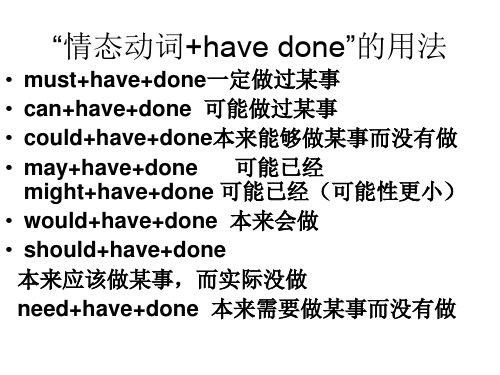
四、 “may+have+done”
• 表示对发生过的事情的推测,意思是“可 能已经”或“也许已经”,用于肯定句中。 • • • • —What has happened to George? —I don't know. He may have got lost. —乔治发生了什么事? ——我不知道,他可能迷路了。
一、 “must+have+done”
• 表示对过去事情的肯定推测,译成“一定 做过某事”,该结构只用于肯定句。 • 1. It must have rained last night, for the ground is wet. 昨晚一定下雨了,因为地面 还是湿的。
2. You must have been mad to speak to the servant. 你和仆人说话,一定是发疯了。
八、 “should+have+done”
• 意思是“本来应该做某事,而实际没做。” “shouldn‘t+have+done”表示本来不应该做某 事,而实际做了。含有指责对方或自责的含意。 • • 1. Tom, you are too lazy. The work should have been finished yesterday. 汤姆,你太懒惰了,这 项工作本来应该昨天就做完的。 • 2. Look, Tom is crying. I shouldn't have been so harsh on him. 看,汤姆哭了,我本来不应该对他 如此严厉。
九、 “ought to+have+done”
• 表示过去应该做而实际并没有做,译成 “理应做……”,往往表示遗憾。与 “should+have+done”用法基本一样。
情态动词 + have done

情态动词+ have done*表示推测时,“情态动词+have done”和“情态动词+do”的显著区别在于:前者表示过去的、有结果的事情的推测;后者表示对现在或将来的推测。
Harry is feeling uncomfortable. He _______________(dink) too much at the party last night. Why are your eyes are so red? You ____________________(sleep) well last night.We _______________________(visit) the museum but we spent too much time shopping.He _______________________(arrive) in Beijing.He might have given you help, even though he was very busy.Yesterday was the deadline, and he should have completed his work.We needn’t have bought so much food now that Tom won’t come and have dinner with us.*should 的其它用法表示惊异、遗憾、不满,意为“竟然,竟会”【实战演练】1. – I phoned you yesterday morning. A girl answered, but I didn’t recognize the voice.-- Oh, it ______________(be) my younger sister. She was in my room at that moment.2. (2014 陕西高考改编)My book, The House of Hades, is missing. Who ____________(take) it.3.(2013 新课标全国改编)Since nobody gave him any help, he __________________(do) the research on his own.4. (2011 新课标全国改编)They ___________(arrive) at lunchtime but their flight was delayed.5. The boy _____________(take) your book for he has been off for a week.6. Although you_______ find bargains in London, it’s not generally a cheap place to shop.7. I can’t believe it _____________(happen) in broad daylight.8. It’s strange that such a rich man ____________(be) so greedy.9. I am ashamed, sir, that I wasted the many hours when I __________________( study) in class.10. Oh, dear! It’s already twelve o’clock. Hurry up! Mother _______________(wait) anxiously.。
B3UNIT2情态动词+have_done的用法

• 2】 We ________ have proved great adventurers, but we have done the greatest march ever made in the past ten years.
• A. needn't • C. shouldn't B. may not D. mustn't
五、 “might+have+done‖
• 表示对过去事情的推测,might与may意思相
同,但可能性更小。多用于虚拟语气结构 中。
• 1. He might have given you more help, even though he was busy. • 他或许会多给你一些帮助,即使他很忙。 • 2. She might have achieved greater progress, if you had given her more chances. 如果你多给她点机会,她可能已经取得更大的成绩。
―情态动词+have done‖的用法
一、 “must+have+done‖
• 表示对过去事情的肯定推测,译成“一定 做过某事”,该结构只用于肯定句。 • 1. It must have rained last night, for the ground is wet. • 昨晚一定下雨了,因为地面还是湿的。 2. You must have been mad to speak to the servant. 你和仆人说话,一定是发疯了。
• 6. I told your friend how to get to the hotel, but perhaps I ____ have driven her there. • A could • B must • C might • D should
情态动词+have done的构成及用法含译文
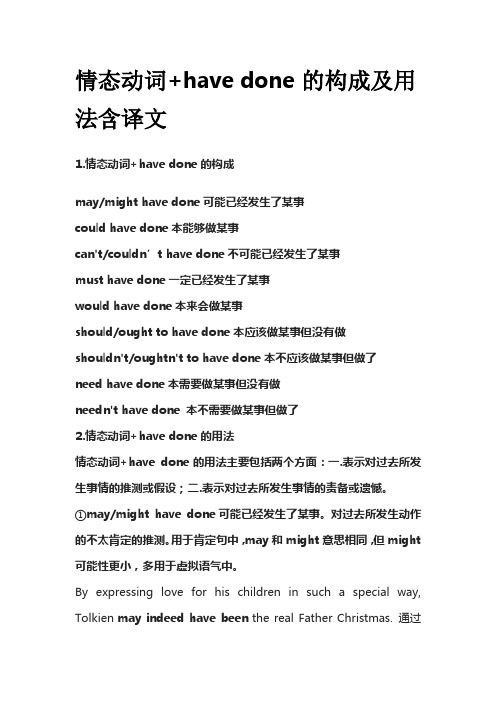
情态动词+have done的构成及用法含译文1.情态动词+have done的构成may/might have done可能已经发生了某事could have done本能够做某事can't/couldn’t have done不可能已经发生了某事must have done一定已经发生了某事would have done本来会做某事should/ought to have done本应该做某事但没有做shouldn't/oughtn't to have done本不应该做某事但做了need have done本需要做某事但没有做needn't have done 本不需要做某事但做了2.情态动词+have done的用法情态动词+have done的用法主要包括两个方面:一.表示对过去所发生事情的推测或假设;二.表示对过去所发生事情的责备或遗憾。
①may/might have done可能已经发生了某事。
对过去所发生动作的不太肯定的推测。
用于肯定句中,may和might意思相同,但might 可能性更小,多用于虚拟语气中。
By expressing love for his children in such a special way, Tolkien may indeed have been the real Father Christmas. 通过这种特别的方式表达对孩子们的爱,托尔金可能真的是真正的圣诞老人。
(新外研版必修二)You can check his office. He might have been there already. 你可以去他的办公室看看。
他可能已经到那儿了。
If he had been given more encouragement, he might have made greater progress. 如果给他更多的鼓励,他可能会取得更大的进步。
情态动词 + have done
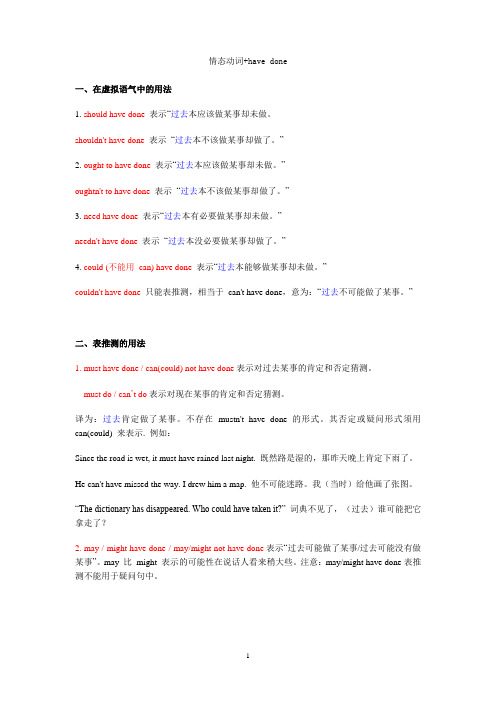
情态动词+have done一、在虚拟语气中的用法1. should have done表示“过去本应该做某事却未做。
shouldn't have done 表示“过去本不该做某事却做了。
”2. ought to have done表示“过去本应该做某事却未做。
”oughtn't to have done表示“过去本不该做某事却做了。
”3. need have done表示“过去本有必要做某事却未做。
”needn't have done表示“过去本没必要做某事却做了。
”4. could (不能用can) have done 表示“过去本能够做某事却未做。
”couldn't have done只能表推测,相当于can't have done,意为:“过去不可能做了某事。
”二、表推测的用法1. must have done / can(could) not have done表示对过去某事的肯定和否定猜测。
must do / can’t do表示对现在某事的肯定和否定猜测。
译为:过去肯定做了某事。
不存在mustn't have done 的形式。
其否定或疑问形式须用can(could) 来表示. 例如:Since the road is wet, it must have rained last night. 既然路是湿的,那昨天晚上肯定下雨了。
He can't have missed the way. I drew him a map. 他不可能迷路。
我(当时)给他画了张图。
“The dictionary has disappeared. Who could have taken it?” 词典不见了,(过去)谁可能把它拿走了?2. may / might have done / may/might not have done表示“过去可能做了某事/过去可能没有做某事”。
情态动词+have done的用法

May/might +have done
表示对过去发生的动作或状态的 推测。 Eg:她那时可能是迷路了。要知 道,这是她第一次去那儿。 She may have lost her way.You know, it was her first time to get there.
Must + have done
这种结构只用于否定句,表示做 了不必要做的事情,意思是本可 不必 你本可以不必把这份报告重写一 遍的. e.g. You needn’t have rewritten the report again.
Should/ought to+have+p.p
用在肯定句中,表示过去应该做 (或值得做)而没有做的事情。 Eg:我本应该在期末考试的时候 好好准备的,但是我去旅行了. I should have prepared for the final exams,but I went to travel.
用于肯定句中,表示对过去事情 的肯定推测,意思是想必,一定, 准是--这位老兵在二战期间一定受了很 多苦。 e.g. The old soldier must have suffered a lot during the Second World War.
Need (not) +于否定句和疑问句 中,表示对过去某事情发生的可 能性的否定或质疑,意为“不可 能/会---的”和“可能/会---的 吗?” Eg: 他不可能学过日语,因为他 一句也不会说。 He can’t have studied Japanese because he can’t say a word.
情态动词+have done的用法
考研语法小知识:情态动词+have done

考研英语情态动词+have done的用法共分为9种,分别为:must have done、may/might have done、can/cannot have done、could have done、might have done、should/ought to have done、needn’t have done、had better have done、would rather have done,具体讲解如下: 情态动词+have done 用法 例句 must have done 表示主观上对过去已经发生的行为进行推测,意为“想必,准是,一定做了某事”。
He was subtilized someone must have entered his room.他敏锐地察觉到一定有什么人进过他的房间。
may/might have done 表示对过去已发生行为的推测,意为“也许/或许已经(没有)……”。
一般用于肯定句或否定句中,不用于疑问句。
用might则表示语气更加不肯定。
A radio announcer may have an audience of millions.一个广播员可能拥有数百万名听众。
can/cannot have done 表示对过去发生的行为的怀疑和不肯定,通常用在否定句和疑问句中。
(can换成could时语气委婉) It beats me how she can have done it.我感到莫名其妙,她怎么竟然做出这样的事。
could have done 可用于肯定句中,表示“可能已经……”之意,此外,还可以表示过去能做而没做的事,有一种对过去未付诸实施的事情的惋惜。
Our ancestors could have killed themselves off with their large brains and dangerous memes, but they pulled through.我们的祖先原本可能会因为自己的硕大头脑和危险的模因而灭亡,好在他们挺了过来。
情态动词+have-done用法
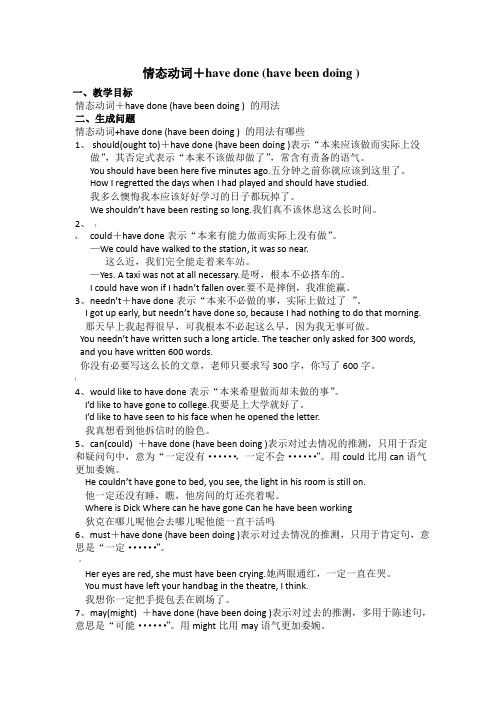
情态动词+have done (have been doing )一、教学目标情态动词+have done (have been doing ) 的用法二、生成问题情态动词+have done (have been doing ) 的用法有哪些1、should(ought to)+have done (have been doing )表示“本来应该做而实际上没做”,其否定式表示“本来不该做却做了”,常含有责备的语气。
You should have been here five minutes ago.五分钟之前你就应该到这里了。
How I regretted the days when I had played and should have studied.我多么懊悔我本应该好好学习的日子都玩掉了。
We shouldn’t have been resting so long.我们真不该休息这么长时间。
2、《3、could+have done表示“本来有能力做而实际上没有做”。
—We could have walked to the station, it was so near.这么近,我们完全能走着来车站。
—Yes. A taxi was not at all necessary.是呀,根本不必搭车的。
I could have won if I hadn’t fallen over.要不是摔倒,我准能赢。
3、needn’t+have done表示“本来不必做的事,实际上做过了”。
I got up early, but needn’t have done so, because I had nothing to do that morning.那天早上我起得很早,可我根本不必起这么早,因为我无事可做。
You needn’t have written such a long article. The teacher only asked for 300 words, and you have written 600 words.你没有必要写这么长的文章,老师只要求写300字,你写了600字。
情态动词+have done用法讲解

1. would have done用于虚拟语气,表示对过去可能发生的情 况进行推测,意为“本来会做” He would have helped me, but he was so busy. 2. need have done 表示“本来需要做某事,但事实上没有做” needn’t have done 则表示“本来不需要做某事,而实际上做了 We need have hurried to school. In that case, we wouldn’t have been late for the class. I needn’t have cooked so many cakes; only two children came.
3. should have done 表示“本来应该做某事,二十几上没有做” shouldn’t have done 则表示“本来不应该做某事,而实际上做 了”,含有职责对法或自责之意。 The essay should have been finished last week, but I forgot it. Tom is crying ; I shouldn’t have been so harsh on him. 4. might have done 表示使对过去情况把握性不大的推测,意为 “可能坐过…”或表示说话人因某人没做某事而不满,意为 “本应该做…” He might have won the race, if you had been backing him. 5. must have done 表示对过去情况的肯定推测,意为“一定做过 某事”,该结构只用于肯定句 It must have rained last night, for the ground is wet.
“情态动词have-done”重点讲解

03
have-done的句型结构
have done句型
表示现在完成时,强调动作已经完成 但对现在有影响。
时态:现在时间点之前完成的动作。
用法:have done + 过去分词,例如: I have finished my homework.
had done句型
表示过去完成时,强调动作在过 去的某个时间之前已经完成。
定义
表示过去的某个时间点,某个动作已经完成或发生 的动作。
表示过去的某个时间点,某个动作已经完成或发生 的动作,并且强调这个动作对现在的影响。
表示过去的某个时间点,某个动作已经完成或发生 ,并且强调这个动作对未来的影响。
用法分类
02
01
03
表示过去的某个时间点,某个动作已经完成或发生, 并且强调这个动作对现在的影响。
3. I _____ (see) the film twice, so I don't want to see it again. (用适当的形式填空)
答案:have been working 答案:has finished 答案:have seen
翻译题练习
1. 我已经完成了我的论文,现
在可以放松一下了。
时态:将来时间点之前完成的动作。
04
have-done的语境与语义
表示经验
用于描述个人或团体过去所经历的事件或状态,强调经验或经历 。
例如:I have been to the Great Wall before. (我之前去过长城 。)
表示结果
01
强调某个动作或行为所产生的结 果或影响。
02
A. has taken B. has lifted C. has been taking D. has been lifting
情态动词+have done 意义及用法区别
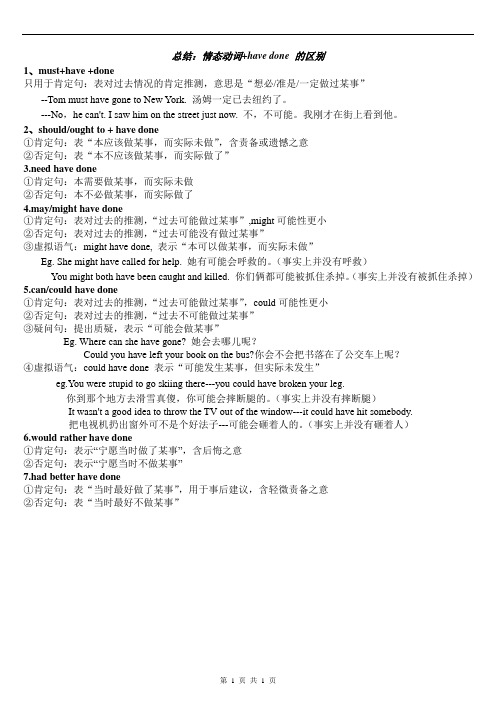
总结:情态动词+have done 的区别1、must+have +done只用于肯定句:表对过去情况的肯定推测,意思是“想必/准是/一定做过某事”--Tom must have gone to New York. 汤姆一定已去纽约了。
---No,he can't. I saw him on the street just now. 不,不可能。
我刚才在街上看到他。
2、should/ought to + have done①肯定句:表“本应该做某事,而实际未做”,含责备或遗憾之意②否定句:表“本不应该做某事,而实际做了”3.need have done①肯定句:本需要做某事,而实际未做②否定句:本不必做某事,而实际做了4.may/might have done①肯定句:表对过去的推测,“过去可能做过某事”,might可能性更小②否定句:表对过去的推测,“过去可能没有做过某事”③虚拟语气:might have done, 表示“本可以做某事,而实际未做”Eg. She might have called for help. 她有可能会呼救的。
(事实上并没有呼救)You might both have been caught and killed. 你们俩都可能被抓住杀掉。
(事实上并没有被抓住杀掉)5.can/could have done①肯定句:表对过去的推测,“过去可能做过某事”,could可能性更小②否定句:表对过去的推测,“过去不可能做过某事”③疑问句:提出质疑,表示“可能会做某事”Eg. Where can she have gone? 她会去哪儿呢?Could you have left your book on the bus?你会不会把书落在了公交车上呢?④虚拟语气:could have done 表示“可能发生某事,但实际未发生”eg.You were stupid to go skiing there---you could have broken your leg.你到那个地方去滑雪真傻,你可能会摔断腿的。
情态动词+have done
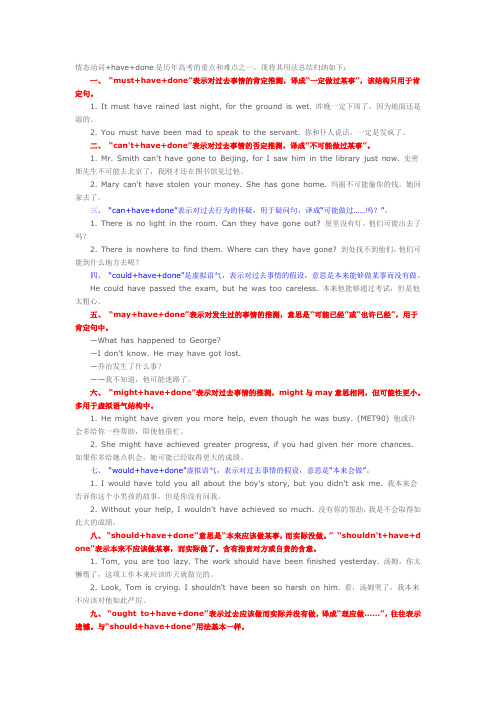
情态动词+have+done是历年高考的重点和难点之一,现将其用法总结归纳如下:一、“must+have+done”表示对过去事情的肯定推测,译成“一定做过某事”,该结构只用于肯定句。
1. It must have rained last night, for the ground is wet. 昨晚一定下雨了,因为地面还是湿的。
2. You must have been mad to speak to the servant. 你和仆人说话,一定是发疯了。
二、“can't+have+done”表示对过去事情的否定推测,译成“不可能做过某事”。
1. Mr. Smith can't have gone to Beijing, for I saw him in the library just now. 史密斯先生不可能去北京了,我刚才还在图书馆见过他。
2. Mary can't have stolen your money. She has gone home. 玛丽不可能偷你的钱,她回家去了。
三、“can+have+done”表示对过去行为的怀疑,用于疑问句,译成“可能做过……吗?”。
1. There is no light in the room. Can they have gone out? 屋里没有灯,他们可能出去了吗?2. There is nowhere to find them. Where can they have gone? 到处找不到他们,他们可能到什么地方去呢?四、“could+have+done”是虚拟语气,表示对过去事情的假设,意思是本来能够做某事而没有做。
He could have passed the exam, but he was too careless. 本来他能够通过考试,但是他太粗心。
五、“may+have+done”表示对发生过的事情的推测,意思是“可能已经”或“也许已经”,用于肯定句中。
情态动词havedone的意思及用法

情态动词havedone的意思及用法
情态动词'have done'是由情态动词'have'和过去分词'done'构成的,表示完成的动作或状态。
这种情态动词常用于描述已经完成或需要完成的动作,并且在口语和书面语中都被广泛使用。
在英语中,情态动词'have done'可以用于多种语境,例如:
1. 表示完成的动作
例如:I have done my homework.(我完成了我的家庭作业。
)
2. 表示对过去发生的事情的确认或否认
例如:Have you done your presentation yet?(你的演讲做好了吗?)
3. 表示对未来事件的推断
例如:By next year, we will have done a lot to protect the environment.(到明年,我们会采取很多行动来保护环境。
)
4. 表示建议或命令
例如:You should have done a better job on that project.(你应该把那个项目做得更好。
)
总的来说,情态动词'have done'可以用于许多不同的语境,使其成为英语中非常有用的一种语言工具。
当你使用这个动词时,确保你的语境清晰明确,以使你的意思更加清楚。
- 1、下载文档前请自行甄别文档内容的完整性,平台不提供额外的编辑、内容补充、找答案等附加服务。
- 2、"仅部分预览"的文档,不可在线预览部分如存在完整性等问题,可反馈申请退款(可完整预览的文档不适用该条件!)。
- 3、如文档侵犯您的权益,请联系客服反馈,我们会尽快为您处理(人工客服工作时间:9:00-18:30)。
I saw Mr. Wang just now. he couldn’t have gone toBeijing.
May/might have done
“也许/或许已经---”一般只用于肯定句和否定句中(在否定句中表示“可能不”),不用于疑问句。用might则表示语气更加不肯定。
It’s too late. I think he may have gone to bed.
I would rather have taken his advice.
I raised objections at the meeting, but now I would rather not have done that.
Would like/love to have done
表示过去愿意做某事,但未做成。
The lights were out. They must have been asleep.
Can/could have done
本来能够过去可能会
You could have come 5 minutes earlier.
Can he have gone to his aunt’s?
Can/could not have done
You had better have started earlier.
You had better not have scolded her.
Would rather have done
表示“宁愿当时做某事”,其否定式would rather not have done表达相反的含义,两者都表示“后悔”之意。
I would love to have gone to the party last night but I had to work extra hours to finish a report.
Shouldn’t/ought not to have done
“ห้องสมุดไป่ตู้不该做而做了某事”
You shouldn’t have told her the truth.
Needn’t have done
表示“做了本来不必去做的事”注意:didn’t need to do表示“没必要做而实际上也没有做某事”。
He may not have finished the work.
She might have caught a cold.
Should/ought tohave done
“本该做某事,而实际上未做”
You should have come to the meeting earlier.
You ought to have done this exercise more carefully.
情态动词+完成时
意义
例句
Must have done表示对过去发生的事情的一种十分肯定的推测
“想必/准是/一定做了某事”,
否定式为can’t/couldn’t have done
It must have rained last night, for the road was quite muddy.
You needn’t have taken a taxi here, for it was very near to my house.
I didn’t need to clean the windows. My brother did it.
Had better have done
用于事后的建议,含轻微责备的口吻,意为“要是当时做了某事就好了”,其否定式had better not have done表达相反的含义。
